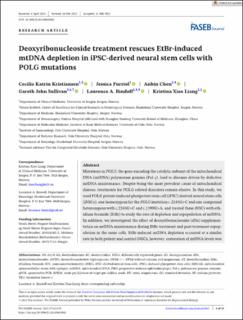| dc.contributor.author | Kristiansen, Cecilie Katrin | |
| dc.contributor.author | Furriol, Jessica | |
| dc.contributor.author | Chen, Anbin | |
| dc.contributor.author | Sullivan, Gareth John | |
| dc.contributor.author | Bindoff, Laurence Albert | |
| dc.contributor.author | Liang, Xiao | |
| dc.date.accessioned | 2024-02-13T10:08:25Z | |
| dc.date.available | 2024-02-13T10:08:25Z | |
| dc.date.created | 2023-10-10T14:32:34Z | |
| dc.date.issued | 2023 | |
| dc.identifier.issn | 0892-6638 | |
| dc.identifier.uri | https://hdl.handle.net/11250/3117213 | |
| dc.description.abstract | Mutations in POLG, the gene encoding the catalytic subunit of the mitochondrial DNA (mtDNA) polymerase gamma (Pol-γ), lead to diseases driven by defective mtDNA maintenance. Despite being the most prevalent cause of mitochondrial disease, treatments for POLG-related disorders remain elusive. In this study, we used POLG patient-induced pluripotent stem cell (iPSC)-derived neural stem cells (iNSCs), one homozygous for the POLG mutation c.2243G>C and one compound heterozygous with c.2243G>C and c.1399G>A, and treated these iNSCs with ethidium bromide (EtBr) to study the rate of depletion and repopulation of mtDNA. In addition, we investigated the effect of deoxyribonucleoside (dNs) supplementation on mtDNA maintenance during EtBr treatment and post-treatment repopulation in the same cells. EtBr-induced mtDNA depletion occurred at a similar rate in both patient and control iNSCs, however, restoration of mtDNA levels was significantly delayed in iNSCs carrying the compound heterozygous POLG mutations. In contrast, iNSC with the homozygous POLG mutation recovered their mtDNA at a rate similar to controls. When we treated cells with dNs, we found that this reduced EtBr-induced mtDNA depletion and significantly increased repopulation rates in both patient iNSCs. These observations are consistent with the hypothesis that mutations in POLG impair mtDNA repopulation also within intact neural lineage cells and suggest that those with compound heterozygous mutation have a more severe defect of mtDNA synthesis. Our findings further highlight the potential for dNs to improve mtDNA replication in the presence of POLG mutations, suggesting that this may offer a new therapeutic modality for mitochondrial diseases caused by disturbed mtDNA homeostasis. | en_US |
| dc.language.iso | eng | en_US |
| dc.publisher | Wiley | en_US |
| dc.rights | Attribution-NonCommercial-NoDerivatives 4.0 Internasjonal | * |
| dc.rights.uri | http://creativecommons.org/licenses/by-nc-nd/4.0/deed.no | * |
| dc.title | Deoxyribonucleoside treatment rescues EtBr-induced mtDNA depletion in iPSC-derived neural stem cells with POLG mutations | en_US |
| dc.type | Journal article | en_US |
| dc.type | Peer reviewed | en_US |
| dc.description.version | publishedVersion | en_US |
| dc.rights.holder | Copyright 2023 The Author(s) | en_US |
| dc.source.articlenumber | e23139 | en_US |
| cristin.ispublished | true | |
| cristin.fulltext | original | |
| cristin.qualitycode | 2 | |
| dc.identifier.doi | 10.1096/fj.202300650RR | |
| dc.identifier.cristin | 2183423 | |
| dc.source.journal | The FASEB Journal | en_US |
| dc.identifier.citation | The FASEB Journal. 2023, 37 (9), e23139. | en_US |
| dc.source.volume | 37 | en_US |
| dc.source.issue | 9 | en_US |

